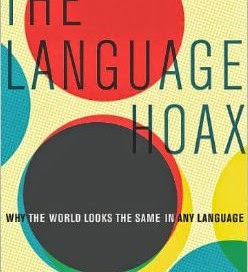Does the world look different if you speak a different language?
Can we tell what someone’s culture is like, just from the structure of their syntax?
For linguists, the answers are no. And no.
John McWhorter is the author of “The Language Hoax”, and he tells Daniel and Ben why the Sapir-Whorf Hypothesis is the most popular bad idea in linguistics on this episode of Talk the Talk.
Listen to this episode
You can listen to all the episodes of Talk the Talk by pasting this URL into your podlistener.
http://danielmidgley.com/talkthetalk/talk_classic.xmlPromo
Show notes
Reporters using more ‘hedging’ words in climate change articles, CU-Boulder study finds
http://www.eurekalert.org/pub_releases/2014-06/uoca-rum060314.php
Information about the book ‘The Language Hoax’
http://www.oup.com.au/titles/academic/linguistics/9780199361588
Interview in Publishers’ Weekly
http://www.publishersweekly.com/pw/by-topic/authors/interviews/article/61698-seeing-the-world-through-language-pw-talks-with-john-h-mcwhorter.html
This NPR has a bit on the other side of the argument.
http://www.npr.org/blogs/health/2013/12/30/258376009/how-language-seems-to-shape-ones-view-of-the-world
The video of the Himba people
http://www.boreme.com/posting.php?id=30670
Update: it was staged, and the crew that staged it took the whole idea way beyond what the research said.
Queensland Treasurer Tim Nicholls labels solar power users as part of the latte set
http://www.cairnspost.com.au/lifestyle/queensland-treasurer-tim-nicholls-labels-solar-power-users-as-part-of-the-latte-set/story-fnjpuwet-1226945498974










18 June 2014 at 4:39 am
There is a distinction between possibilistic and probabilistic theories. McWhorter seems to be denying a possibilistic Sapir-Whorf hypothesis, and proving it wrong by saying: no concept is absolutely inaccessible to any other. Does it address the question of whether certain conceptual distinctions are more likely to occur because they are obligatory in a language? For example, in Polish, you have to pay attention to the mix of genders to grammatically say '6 students' – all male vs all female vs mixed – in a way you do not have to in English. The sex inspecific term is (because of the grammar), really likely in English. Sex specific terms are required in Polish, so the sex inspecific version (basically, a grammatical error) is avoided if ever possible. Doesn't mean English speaking people can't distinguish gender and Poles can: but I don't see how McWhorter's arguments show that English speakers pay just as much attention to the distinction as Poles do.
[BTW] Some of his arguments seem to be reductio-ad-ideologically-unsound: if the S-W hypothesis was true, then we would have to say something which we couldn't say because it is ideologically unsound. Maybe that is more important in some (perhaps the US) academic contexts than others. I've always thought that people with few colour words were prone to making fewer conceptual colour distinctions than Europeans who distinguish more colours. Likewise the Himba do better than us with greens. An even easier way to see this is things like voice-onset times in consonants, or place of articulation. If you know a language natively, you can get the right values for VOT and hear it when someone else gets it wrong. Non-native speaker will likely struggle if their native language has quite different targets … eg. Spanish speakers speaking English, or (I imagine) English speakers speaking Hindi.[/BTW]
Basically, what I'm saying here is that (fairly trivially) all languages are 'Turing complete', i.e. can say anything any other language can say. BUT. The distinctions that are _likely_ to be made will depend on the grammatical requirements and lexical resources of the language. (Just as in information theory, different 'Turing complete' computers can result in very different probability distributions over program outputs.)
A good point, though, is whether we'd expect to see a correlation between features of a society and features of the corresponding language. If people aren't making a distinction, then we'd not expect to see their grammar requiring that distinction (e.g. if people are really bad at making reliable round/flat distinctions, it's a bummer if their language requires everything to be round or flat). I'd say it follows that any grammatically marked distinction is a distinction that is conceptually accessible and robust, whether or not it is socially evaluative (eg. masc=bad, femm=good, or suchlike). So a grammar, insofar as it requires categorial distinctions, requires you to make those distinctions. In many continental European languages, you have to continually choose whether the person you address is at a formal distance or is treated as in-group/intimate. I never worried about that nearly so much before I learned one of these languages, only on the rare occasions where I had to use their name and wondered Mr/s + Surname or Firstname alone. In Polish, I have to worry about that any time my interlocutor is the subject or object of a verb.
PS You can know a lot of grammars, and not agree with McWh.
20 June 2014 at 2:25 am
but I don't see how McWhorter's arguments show that English speakers pay just as much attention to the distinction as Poles do.
True — I don't think he's trying to take it to that level, but he is commenting on how absurd it would be to say that Polish speakers are more sensitive to what gender someone is. Are they? Could we find out with a very fine-grained experiment? Maybe. I don't know if anyone would want to. Unaware of gender somehow because of language? Seems weird, but I don't know.
Some of his arguments seem to be reductio-ad-ideologically-unsound: if the S-W hypothesis was true, then we would have to say something which we couldn't say because it is ideologically unsound.
Right, and this was something I thought after the interview: Well, yes, maybe it's distasteful to say that language might make people cognitively less capable in some ways, but if that's true, shouldn't we say it and accept it? John's point was that even Whorfians don't intend to say that. And why not? Because Whorfianism is not really coherent.
In many continental European languages, you have to continually choose whether the person you address is at a formal distance or is treated as in-group/intimate. I never worried about that nearly so much before I learned one of these languages, only on the rare occasions where I had to use their name and wondered Mr/s + Surname or Firstname alone.
I noticed this too when I studied Spanish and French. I had to become aware of it linguistically. But I was already aware of social distance socially, even if it wasn't instantiated grammatically in English. It wasn't a completely unknown concept for me, just not as explicit. Which, for McWhorter, makes sense. It's still a thing for English speakers.